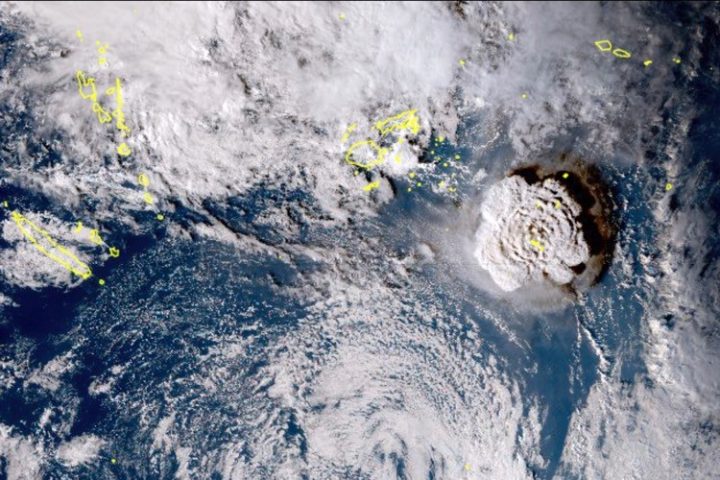
From the “did-he-really-say-that?” department, CBS Mornings co-host Nate Burleson appears to have found a new climate-change-related disaster that not even Al Gore or Leonardo DiCaprio has jumped on yet. In a recent show, Burleson linked the volcano that began to erupt on January 14 in the island nation of Tonga to man-made climate change.
The Hunga-Tonga-Hunga-Ha’apai Volcano, which, according to NASA scientist JIm Garvin, released “hundreds of times the equivalent mechanical energy of the Hiroshima nuclear explosion,” caused a massive tsunami estimated at nearly 50 feet high in some places.
Burleson, a former NFL player, linked the seismic event to climate change in a clumsy exchange on the CBS morning show. In a segment discussing the eruption, Burleson said, “You know, oftentimes we talk about climate change quite a bit. These stories are a harsh reality of what we’re going through, and we have to do our part because these are more frequent.”
For the record, even the most ardent climate hysteric understands that climate change doesn’t cause volcanoes to erupt. A 1999 Scientific American article explains, “Although there are several factors triggering a volcanic eruption, three predominate: the buoyancy of the magma, the pressure from the exsolved gases in the magma and the injection of a new batch of magma into an already filled magma chamber.”
Nothing in there about carbon dioxide building up in the atmosphere, leading to global warming and causing volcanoes to erupt.
When NewsBusters’ managing editor Curtis Houck challenged Burleson on the comment, the morning show anchor would later tweet that he didn’t mean what he said, claiming that, “Mother Nature has ways of contributing to climate change, so we need to do our part to take care of this planet.”
This prompted Houck to post a transcript of the exchange and point out, “The transcript doesn’t lie, Nate! The discussion went from wave heights to climate change. And volcanoes erupting and burying towns was obviously around well before any of us were alive.”
The very fact that Burleson said, “because these are more frequent,” shows that either Burleson or the staff writers on CBS Mornings wanted to at least give the impression that the eruption itself and the accompanying tsunami was somehow linked to climate change. Otherwise, why even mention it?
As for Tonga, the island nation has reported only three deaths associated with the eruption and resulting tsunami thus far, although that number could increase as the damage continues to be assessed. News from the country has been slow coming out, but some footage released shows flattened and destroyed crops and buildings covered in volcanic ash. Aid has begun to arrive from around the world.
Thus far, the island nation has reported only one case of COVID-19 and no deaths from the Chinese virus.
The volcano’s eruption “was equivalent to somewhere between 4 to 18 megatons of TNT,” NASA’s Garvin said. In comparison, Mt. St. Helen’s eruption in 1980 was estimated to have released 24 megatons of energy, and the massive eruption of Krakatoa in 1883 is estimated to have released 200 megatons of energy.
In a historical irony, scientists believe that it was the eruption of Mt. Tambora in 1815 that caused the so-called Year Without a Summer of 1816, when global temperatures dropped due to the ash cloud blocking sunlight.
So, yes, volcanoes can cause climate change to some degree but, contrary to what Burleson seemed to suggest, climate change does not lead to more frequent volcanic eruptions.




